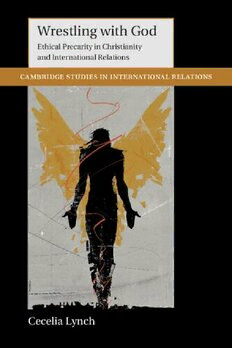
Wrestling With God: Ethical Precarity In Christianity And International Relations PDF
Preview Wrestling With God: Ethical Precarity In Christianity And International Relations
| Wrestling with God Contrary to charges of religious “dogma,” Christian actors in inter- nationalpoliticsoftenwrestlewiththelackofaclearpathindetermining what to do and how to act, especially in situations of violence and when encountering otherness. Lynch argues that it is crucial to recognise the ethical precarity of decision-making and acting. This book contextualizes and examines ethical struggles and justifications that key figures and movementsgaveduringtheearlymodernperiodofmissionaryactivity in the Americas; in the interwar debates about how to act vis-à-vis fascism, economic oppression and colonialism in a “secular” world; in liberation theology’sdebatesabouttheuseofviolenceagainstoppressionandblood- shed; and in contemporary Christian humanitarian negotiations of reli- giouspluralismandchallengestotheassumptionsofwesternChristianity. LynchexploreshowthewrestlingwithGodthattookplaceineachofthese periods reveals ethical tensions that continue to impact both Christianity andinternationalrelations. cecelia lynch is a professor of political science at the University of California,Irvine.HerbookBeyondAppeasement(1999)wontheMyrna BernathBookPrizeandtheEdgarFurnissBookPrize.Sheistherecipient of the J. Ann Tickner Award (2014) and was recognised as the Inter- national Political Sociology Distinguished Scholar (2019), both awarded byISA. Cambridge Studies in International Relations: 152 Wrestling with God Editors EvelynGoh ChristianReus-Smit NicholasJ.Wheeler Editorial Board JacquelineBest,KarinFierke,WilliamGrimes,YuenFoongKhong, AndrewKydd,LilyLing,AndrewLinklater,NicolaPhillips,Elizabeth ShakmanHurd,JacquieTrue,LeslieVinjamuri,AlexanderWendt CambridgeStudiesinInternationalRelationsisajointinitiativeofCambridge UniversityPressandtheBritishInternationalStudiesAssociation(BISA).The series aims to publish the best new scholarship in international studies, irre- spectiveofsubjectmatter,methodologicalapproachortheoreticalperspective. TheseriesseekstobringthelatesttheoreticalworkinInternationalRelations tobearonthemostimportantproblemsandissuesinglobalpolitics. CambridgeStudiesinInternationalRelations 151 BrentJ.Steele RestraintinInternationalPolitics 150 EmanuelAdler WorldOrdering ASocialTheoryofCognitiveEvolution 149 BrianC.Rathbun ReasoningofState RealistsandRomanticsinInternationalRelations 148 SilviyaLechnerandMervynFrost PracticeTheoryandInternationalRelations 147 BentleyAllan ScientificCosmologyandInternationalOrders 146 PeterJ.KatzensteinandLuciaA.Seybert(eds.) ProteanPower ExploringtheUncertainandUnexpectedinWorldPolitics 145 CatherineLu JusticeandReconciliationinWorldPolitics 144 AyşeZarakol(ed.) HierarchiesinWorldPolitics Serieslistcontinuesafterindex Wrestling with God Ethical Precarity in Christianity and International Relations cecelia lynch UniversityofCalifornia,Irvine UniversityPrintingHouse,CambridgeCB28BS,UnitedKingdom OneLibertyPlaza,20thFloor,NewYork,NY10006,USA 477WilliamstownRoad,PortMelbourne,VIC3207,Australia 314–321,3rdFloor,Plot3,SplendorForum,JasolaDistrictCentre, NewDelhi–110025,India 79AnsonRoad,#06–04/06,Singapore079906 CambridgeUniversityPressispartoftheUniversityofCambridge. ItfurtherstheUniversity’smissionbydisseminatingknowledgeinthepursuitof education,learning,andresearchatthehighestinternationallevelsofexcellence. www.cambridge.org Informationonthistitle:www.cambridge.org/9781108483377 DOI:10.1017/9781108649599 ©CeceliaLynch2020 Thispublicationisincopyright.Subjecttostatutoryexception andtotheprovisionsofrelevantcollectivelicensingagreements, noreproductionofanypartmaytakeplacewithoutthewritten permissionofCambridgeUniversityPress. Firstpublished2020 AcataloguerecordforthispublicationisavailablefromtheBritishLibrary. ISBN978-1-108-48337-7Hardback ISBN978-1-108-70484-7Paperback CambridgeUniversityPresshasnoresponsibilityforthepersistenceoraccuracy ofURLsforexternalorthird-partyinternetwebsitesreferredtointhispublication anddoesnotguaranteethatanycontentonsuchwebsitesis,orwillremain, accurateorappropriate. for my parents Contents Acknowledgments page viii 1 Wrestling with God in the Modern West 1 2 Understanding Christian Wrestling about Ethics 38 3 Wrestling with the Violence of Conquest 70 4 Wrestling with Warin aModern World 107 5 Wrestling with the Violence of Oppression 147 6 Wrestling with Violence and Injustice Abroad and atHome 187 7 Has Anyone Prevailed? 234 Bibliography 243 Index 273 vii Acknowledgments GrowingupinthereligiousMidwestoftheUnitedStates,Iknewonly Christians (though I’m sure they also included budding agnostics and atheists) until I was in my late teens. While our Catholic community was fairly tight, the Protestants were even closer knit. I often wonder what the parents of our neighborhood friends would have done had they known that one of my sisters tried to baptize their children with holy water and a rosary.As I grew older, lived in Paris for two of my university years, and later began to conduct research on social forces andinternationalpolitics,mychildhoodexperiencesappearedincreas- inglynarrow.Atthesametime,thenew,moreglobalandmuchmore worldly communities I interacted with frequently displayed what seemedtomeanastonishinglackofknowledgeandadeterminedlack ofconnectionwithreligionorspirituality.Narrownessandworldliness werenotsoeasytodefineafterall.Bytheyear2000,Ihadbecomepart ofthechallengetothesecularistassumptionsofinternationalrelations. I have wrestled with Christianity, religion in general, secularism, “faith,”“belief,”“pluralism,”andspirituality,andIprobably always will. Fortunately, I have been accompanied by wonderful friends and mentors of all kinds. Michael Loriaux’s self-avowed “premodern” interrogations never cease to be enlightening, and Siba Grovogui’s stories of his Jesuit education in a dynamic postcolonial society have eachmademethinkinnewways.MarcosScausoandTanyaSchwarz are not only former students but also valued friends and colleagues. Thisbookcouldnothavebeenwrittenwithouttheperceptiveinsights and comments of Jason Springs and Atalia Omer, who have become indispensableandincrediblygenerouscomradesinsideandoutsidethe academy. I also had the good fortune to become neighbors for a semester with the wonderful Slavica Jacelik, who challenged and deepened my understanding of secularisms in incomparable ways. Each of these – in addition to David Blaney, Andrea Paras, Gina Giliberti, and Hafsa Oubou – very generously read and perceptively viii Acknowledgments ix commented on more than one chapter of the book. Erin Wilson, Jack Miles, Keith Nelson, Stan Bailey, Maria Birnbaum, Olivier Roy, MartinHeisler,TarakBarkawi,AmyRoss,BethHurd,ScottAppleby, Mark Juergensmeyer, Bogdan Radu, Mona Sheikh, Brent Steele, Dvora Yanow, Jonathan VanAntwerpen, the late Fr. Dean Brackley, and Craig Calhoun, among others, also provided valuable comments and/oropportunitiestoengagewithaudiencesinarangeofinstitutions atvariousstagesalongtheway;RanjitMathewsintroducedmetothe work of Christopher Duraisingh. The seeds of the project were developed even earlier, during a Social Science Research Council– MacArthur Foundation Fellowship on Peace and Security in a Changing World, which provided the luxury of exploring theologies and ethics at the University of Chicago Divinity School. In particular, I want to thank Dwight Hopkins, Susan Schreiner, and the late Jean BethkeElshtainforverydifferentinsightsintoChristianityduringthat period and my interlocutors in San Salvador for their time in gener- ously meeting with me to explaintheir experiences with base commu- nities.IconductedresearchforChapter3attheHuntingtonLibraryin San Marino, California, enabled by funding from an Andrew W. Mellon Huntington Library Fellowship; the American Association ofUniversityWomen’sAmericanPost-DoctoralFellowshipmadepos- sibleearlydraftsofthatchapteraswellasseveralarticles. Ialsowant to thank the Andrew W. Mellon Foundation for a “New Directions” fellowship that enabled me later to conduct research in many parts of Africa (among other places), informing Chapter 6, although most of the product of that grant will be published in a separate book. It is worthrepeatingthatitistheseassociationsandfoundationsthatmake the difference for so many scholars, including myself; they are invalu- able assets to critical scholarship of all kinds. Former undergraduate studentswhoprovidedexcellentresearchassistanceincludeLeslieMay Legaspi (especially for the IRFA discussed in Chapter 6) and Yesenia Gutierrez,whoprovidedtranslationsformaterialsinChapter3aswell as indispensable assistance in the final stages. Portions of the project were presented at the University of Chicago, European Institute in Florence, Normative Orders project in Frankfurt, University of Notre Dame, University of Kansas, Northwestern University, University of Utah, Socio-Legal Workshop at UC Irvine, Religious Studies Seminar atUCIrvine,WellesleyCollege,UniversityofGroningen,Universityof California, Santa Barbara, University of Hamburg, University of
